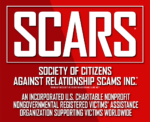SCARS™ Scammer Urban Legends – Chapter 2 – Scammers Are Stupid?
You Hear This All The Time From Victims
One of the things that is disturbing about many scam victims is the need to invent a mythology about scammers that simply isn’t true.
Unfortunately, incompetent anti-scam groups do this too.
This is a natural reaction, but it is wrong
This is especially true when you are confronting someone that you can do nothing about. For example a criminal, your next door neighbor, a hater, your daughter’s boyfriends, a political candidate, President Trump (actually we like him a lot – because he is the first president in decades to really do something against scammers).
Instead of looking objectively at the facts about these people (scammers), people revert to emotional name calling.
Unfortunately, this DOES NOT help you deal with the reality of the situation or the person (the scammer). It creates a barrier that blocks you from a full understanding of what happened, your role in it, and how to prevent it in the future. It holds you back from recovering – preventing you from adapting to the situation in a healthy way – and allowing you to find a new future.
Scammers Are Not Stupid
Scammers are normal people. Some of them are brilliant, especially those that have risen to the upper levels of their criminal organizations. Some are not. Just like anyone else.
Scammers are the product of their educational environment. Some are moderately well educated, and some are even university graduates. Some only have basic educations. Some write and read poorly – especially since English is not their first language.
Think about that. Most scammers are multilingual. Most Americans are not!
They come from a culture of superstition (which is another word for religion). Some believe incomprehensible faiths, some are Muslim. All of this imparts a separation between them and the cultures of the Western and even Asian cultures, yet somehow they manage to communicate their fakery sufficiently well to get money from a million people a year.
Scammers are professionals. This is their job, their work, their profession. Frankly, most of them are very good at it. They employ complex methodologies, follow scripts, work a process. In many ways, they are actors and actresses playing a role.
What tends to make us believe they are stupid is the way they act when confronted with the truth about their activity.

SCARS™ Team
A SCARS Division
Miami Florida U.S.A.
END
– – –
Tell us about your experiences with Romance Scammers in our Scams Discussion Forum on Facebook »
– – –
FAQ: How Do You Properly Report Scammers?
It is essential that law enforcement knows about scams & scammers, even though there is nothing (in most cases) that they can do.
Always report scams involving money lost or where you received money to:
- Local Police – ask them to take an “informational” police report – say you need it for your insurance
- Your National Police or FBI (www.IC3.gov)
- The SCARS|CDN™ Cybercriminal Data Network – Worldwide Reporting Network HERE or on www.Anyscam.com
This helps your government understand the problem, and allows law enforcement to add scammers on watch lists worldwide.
– – –
Visit our NEW Main SCARS Facebook page for much more information about scams and online crime: www.facebook.com/SCARS.News.And.Information
To learn more about SCARS visit www.AgainstScams.org
Please be sure to report all scammers HERE or on www.Anyscam.com
All original content is Copyright © 1991 – 2018 SCARS All Rights Reserved Worldwide & Webwide – RSN/Romance Scams Now & SCARS/Society of Citizens Against Relationship Scams are all trademarks of Society of Citizens Against Relationship Scams Incorporated (formerly the Society of Citizens Against Romance Scams)
Legal Notices:
All original content is Copyright © 1991 – 2018 SCARS All Rights Reserved Worldwide & Webwide. Third-party copyrights acknowledge.
SCARS, RSN, Romance Scams Now, SCARS|GLOBAL, SCARS, Society of Citizens Against Relationship Scams, Society of Citizens Against Romance Scams, SCARS|ANYSCAM, Project Anyscam, Anyscam, SCARS|GOFCH, GOFCH, SCARS|CHINA, SCARS|CDN, SCARS Cybercriminal Data Network, Cobalt Alert, Scam Victims Support Group, are all trademarks of Society of Citizens Against Relationship Scams Incorporated.
Contact the law firm for the Society of Citizens Against Relationship Scams Incorporated by email at legal@AgainstScams.org





Please Leave A Comment - Tell Us What You Think About This!